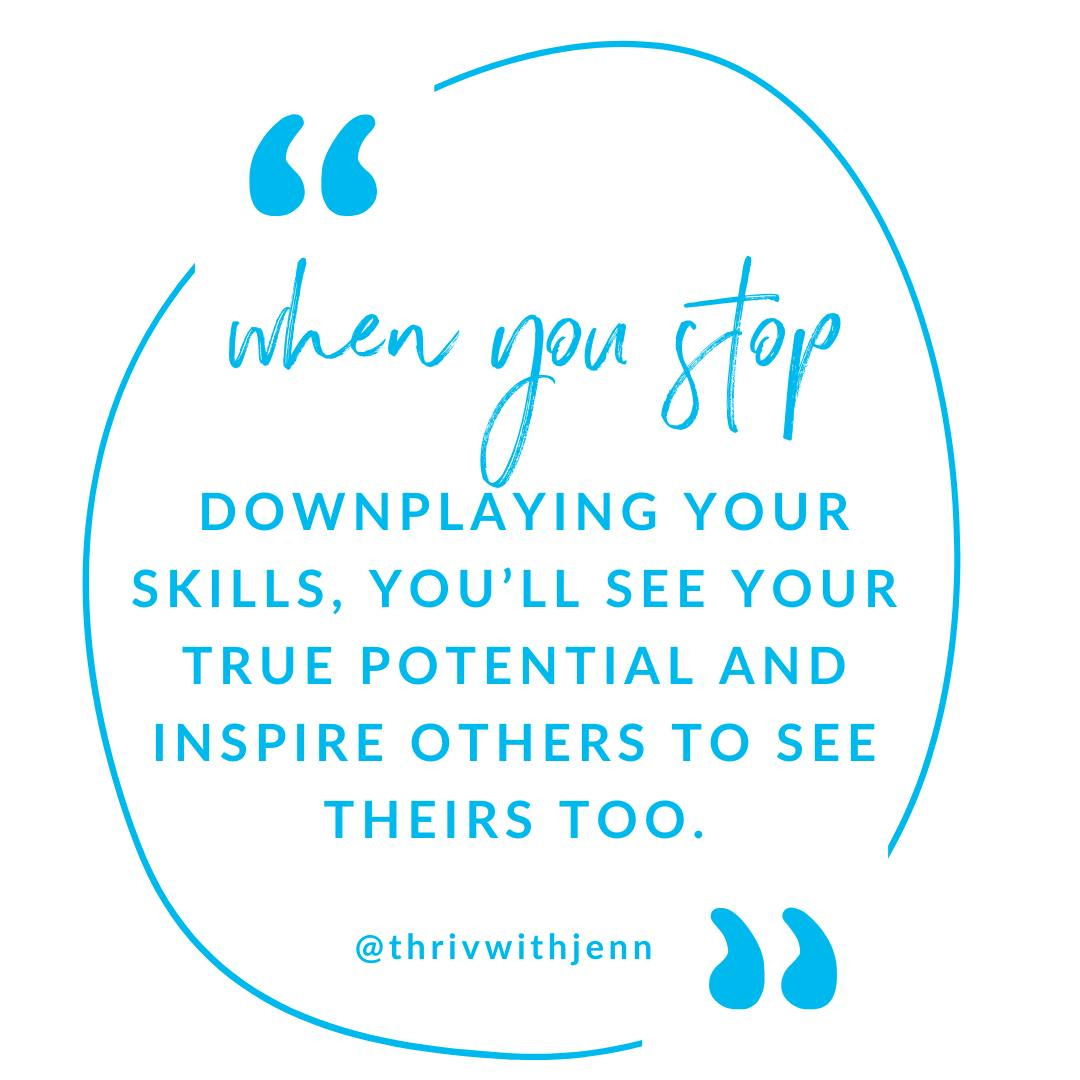Let’s talk about something that’s a little tricky but oh-so-important: humility—and how to invite this empowering force into your career while shutting the door on imposter syndrome. We touched on imposter syndrome last week, and if you missed it, you can catch up here,
"Success starts with believing in yourself—don’t let imposter syndrome steal that away from you."
Remember that feeling when you get a compliment and immediately brush it off with an “Oh, it was nothing” or “I just got lucky”? If that sounds familiar, please read on!
I used to be that person. Someone would compliment my work, and I’d practically run from it, as if acknowledging the value someone saw in me and saying “thank you” would mean I wasn’t humble.
But here’s the thing: constantly brushing off your hard work and talent doesn’t make you humble—it makes you a victim of imposter syndrome. Not being able to take a compliment or consistently self-deprecating is a clear sign you're struggling with imposter syndrome. Let’s dive into the real difference between humility and imposter syndrome because owning your talents while staying humble is an empowering place to be. Here’s the breakdown:
Negating a Compliment vs. Graciously Accepting It
If your first instinct is to downplay a compliment—“Oh, it was no big deal” or “I just got lucky”—that’s imposter syndrome sneaking in, my friend. It’s that little voice telling you that you didn’t really earn the praise. You’re actually creating more work for yourself by validating this imposter mindset. If you embrace the fact that imposter syndrome is the persistent inability to believe that one's success is deserved or has been legitimately achieved as a result of one's own efforts or skills, then you’ll understand that brushing off compliments as “luck” is only reinforcing your belief that you’re an imposter.
The Difference Between "I Just Got Lucky" & "Feeling Lucky"
The fact that you love something and therefore it comes easy to you just brings out that "feeling lucky" vibe. To be able to work doing something you love means you should not only acknowledge the work you put into it, but I think you should be getting paid more because you are following your intuition and pursuing your calling. When your expertise, skills, and talents are complemented by your passion, that shit is valuable. Like really, really valuable. People are not only getting your expertise, time, and energy, but they are also getting your heart and soul. That is rare and, can I say it again, valuable, and yes, it should feel easy and feel lucky—that’s your heart talking with gratitude. And I want you to own all the parts of you that showed up and did the work to get to a point of feeling so blessed that it feels like luck!
So stop downplaying the compliments. You did the work. It's okay if it was easy work, and it’s okay if, at times, it was hard. It's your dedication and intention to pursue what you love, and when something is just easier for you—remember to others it's hard as hell!—that's why they need you and your skills and your talents ... and that is... SO VALUABLE!
When you respond with, “Thank you, I love what I do, I worked hard on this, and I appreciate you noticing,” you’re acknowledging your efforts, talents, and energy without inflating your ego. You are thriving within your community! You’re owning your work and shining with empowered humility through joy and authentic gratitude. You’re not just giving yourself credit while staying grounded, you are connecting with your community by receiving the compliment.
Feel more grounded in your career by learning a simple yet powerful tool to challenge what is holding you back—the ones that keep you stuck in old patterns, convinced the past will repeat itself. These stories can stop you from leveling up your talents, skills, and career, and prevent you from fully embracing your passion.
It's time to give yourself a break from your inner critic and start cultivating a new, empowering narrative. In my next hour-long workshop, I'll guide you through the process I used to become my own cheerleader—creating affirmations you can actually get behind and that stick around long enough to actually bring your vision into reality.
Join me live on September 25th from 11:30 AM to 12:30 PM or in person at ThrivHOUSE in the Conversation Room on Saturday, September 28th from 10:00 AM to 11:00 AM. Payment is donation-based, reflecting the value you place on our time together. I’ll be guiding you through rewriting your past stories into empowering motivations to move you forward. You will be accepting complements and new business success like an empowered leader!
If you're interested, just reply to this email or sign up here, and I’ll send you all the details. Let me know which date you’ll be attending!
If you can't attend in person or online but would like to watch the replay, join my community, where you'll have access to it after.
Downplaying Your Talents vs. Owning Them
Ever say, “Anyone could have done that” after you’ve completed a big project or achieved something amazing? Yeah, that’s imposter syndrome at work. You’re rejecting your unique abilities and stopping yourself from stepping into your full potential.
When you say, “I’ve worked hard to develop this talent,” or “I’m proud of what I’ve accomplished,” you’re owning it. You’re saying,
“Hey, I’m good at what I do, and I’m not afraid to show it.”
That’s empowerment, not arrogance. And this is what the world needs more of—an empowered you!
False Humility vs. Empowering Humility
Here’s where we get into the tricky part. False humility is when you downplay your success to make sure everyone knows you’re modest—or worse, to avoid making others feel uncomfortable or jealous because of your talents and accomplishments. I would often give credit to others to empower them, but in doing so, I was holding myself in a comfort zone, deflecting the praise and not owning my skill set too. I would also downplay my talents because they came so easily to me, and in my mind, that made me less valuable!
False humility is actually a form of self-rejection. When you deflect all the credit—“It wasn’t me, it was the team”—you’re taking yourself out of the equation, even though you know you played a major role.
True humility is when you say, “Thank you, I’m really proud of the work I did, and I couldn’t have done it without my amazing team.” You’re acknowledging both your contribution and others without downplaying your role. This is empowering humility—lifting yourself up while staying grounded in gratitude and the value received by the compliment giver.
Speaking to Your Success vs. Self-Sabotaging Dialogue
If your inner voice is saying things like, “I don’t deserve this success” or “I’m just lucky,” it’s time for a chat with yourself. Those thoughts are keeping you stuck in self-doubt. Quality self-talk is about consistently monitoring and evolving the words we use in our internal and external dialogues. It’s not just about positivity; it’s about alignment. For example, you might value compassion, but if your self-talk is self-critical or judgmental, you’re negating that core value.
Flip the script to something like, “I’ve worked hard, and I deserve to succeed,” or “I’m proud of what I’ve accomplished, and I’m ready for more.” This simple shift in your dialogue changes everything! You’ll start seeing your true value, which builds confidence and resilience.
Humility = Gratitude + Self-Validation
Humility isn’t about shrinking to avoid being seen; it’s about acknowledging your growth with gratitude. When you accept compliments and praise, express gratitude for the journey that’s brought you here. It’s a way of staying grounded while recognizing your own hard work.
Self-validation can be your new best friend and might I add essential to your success. Instead of waiting for others to validate your success (a classic imposter syndrome trait), start with yourself. Know that you’ve earned every ounce of it! Even if what you do comes easily to you, and you’ve been putting up roadblocks just so you can validate your skills and talents by making things harder, you have permission to stop that. And I suggest you take some of that energy and work on leveling up your self-worth.
Owning It: A Reflection
How do you respond to compliments?
How do you talk about your accomplishments?
Are you downplaying your skills to keep yourself “humble,” or are you truly owning the work you’ve put in?
When we start owning our talents with humility, we step into a space where we can grow, lead, and thrive—without fear of being seen as arrogant. In this space, not only do things get easier for you, but you also open up space for others to benefit from your talents and skills, making the world a better place.
Here's a practice for ya ... x2:
Next time someone compliments your work or talents, resist the urge to downplay it. Instead, graciously accept it with a simple “Thank you, I’m proud of that” or “I worked hard on this.” It’s not about being boastful; it’s about owning your story.
And then, look in the mirror and give yourself a compliment grounded in gratitude and appreciation for the work and energy you afford yourself. Own your successes so they can benefit the rest of us.
If you want to dive deeper into owning your talents and dismantling imposter syndrome, make sure you are in the know about our monthly community table workshops or let’s continue the conversation in the ThrivUNITY Community. I’d love to hear how you’re embracing humility and moving forward with empowered confidence!
Speaking To Your Success
Let’s explore the importance of quality self-talk, a crucial element in aligning our daily lives with our core values, purpose, and goals. The way we speak to and about ourselves, both aloud and in our thoughts, profoundly impacts our lives.
Quality self-talk is about consistently monitoring and evolving the words we use in our internal and external dialogues. It's not just about positivity; it's about alignment. For example, you might value compassion, but if your self-talk is self-critical or judgmental, you're negating that core value.
As the adage goes, "We are what we repeatedly do and say." Being mindful of our words is crucial because they shape our reality. This concept is not just personal; it's also a powerful marketing strategy. Businesses use branded language consistently to shape customer perception and create a recognizable identity.
Consider the impact of fast-food chains. Their success isn't just about the food but how they've consistently marketed their benefits, shaping public perception over quality. Similarly, the words we use about ourselves and our endeavors greatly influence how others perceive us and, more importantly, it shines a light how we perceive ourselves.
Keep reading with a 7-day free trial
Subscribe to ThrivUNITY to keep reading this post and get 7 days of free access to the full post archives.








